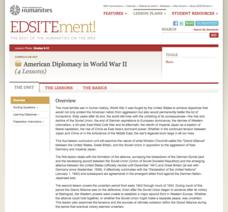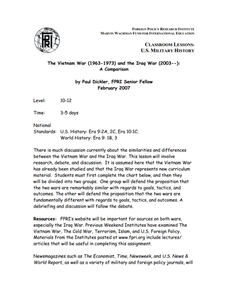Constitutional Rights Foundation
The Cold War: How Did It Start? How Did It End?
What is the difference between a Cold War and a Hot War? Scholars research the beginning of the Cold War. They analyze diary entries as well as excerpts from various events during the 45-year standoff. To finish, they prepare final...
University of California
Roots of the Cold War
When and how did the Cold War begin? To answer this question, you will not find a better-organized, in-depth, activity- and inquiry-based resource than this! Executing best teaching practices throughout, each portion of this inquiry...
Curated OER
Cold War Conflict in Vietnam: The Vietnam-Era Presidency
Comparing and evaluating various media types is a great way to build critical analysis skills. Learners read about the Vietnam era presidency, specifically the foreign policy established by Johnson and Nixon. Then they compare several...
DocsTeach
President Reagan and the Cold War: Vision and Diplomacy
After years of boiling tension, the presidency of Ronald Regan and the rise of Mikhail Gorbechev paved a new way forward for diplomacy between the United States and the Soviet Union. Using primary source documents, including letters...
BAE Systems
The Cold War
The Soviet Union's decision to block West Berlin from access by the Western allies began an international hostility that extended into the rest of the twentieth century. Class members examine both Harry Truman's and Joseph Stalin's...
Carolina K-12
NATO: After the Cold War
Why was the North Atlantic Treaty Organization (NATO) formed, and what is its mission? Learners discuss NATO's participation in various events throughout the Cold War and work in groups to analyze whether those responses were appropriate.
Smithsonian Institution
The Soldier’s Experience—Vietnam versus World War I
The Vietnam War and World War I were two very important—and different—wars. To understand the differences, and similarities, class members watch videos, examine primary source documents, and then create a newscast that examines the...
Center for History Education
Guatemalan Coup of 1954: How Did the Cold War Influence American Foreign Policy Decisions?
Was it all about the bananas—or the fear of a communist threat? Young historians use a history lab to examine documents from the American-led 1954 Guatemalan coup. Using graphics, government documents, and speeches, they examine the...
University of California
The Vietnam War (1945 – 1975)
Have you ever wanted to do something so perfectly you wound up not doing it well at all? Young historians use primary and secondary documents to analyze the United States involvement in the Vietnam War. The issues surrounding the...
Smithsonian Institution
POWs
Why did Vietnam POWs and their families receive more media attention than POWs in previous wars? To answer this question, class members view artifacts, read articles, and engage in class discussion. Individuals then assume the...
University of California
Decolonization
The ripple effect from one small event can impact many others. Young historians research the ripple effect World War II had on decolonization in the second installment of an eight-part series. Through primary and secondary documents as...
University of California
Principles vs. Practices
Have you ever wondered what your own World Order would look like? Scholars use primary and secondary documents as well as video clips to investigate and analyze the Cold War. Using the sources, the principles and practices of nations...
Mrs. Robbins' Social Studies Site
The Berlin Blockade
The Berlin Blockade may not take up as much space in the history books as other events of the Cold War, but for the citizens of west Berlin in 1948—and the events to follow between the Soviet Union and the United Stattes—those 318 days...
Smithsonian Institution
The Price of Freedom: Americans at War
An interactive resource covers all of the United States' most prominent and influential historic wars including the Vietnam War, the Cold War, the War of 1812, and the Korean War. Learners observe cause and effect as well as how violence...
University of California
Containing Communism Abroad
Learn more about the policy of the United States to contain communism during the Cold War. The fifth installment of an eight-part series looks at primary and secondary materials about a challenging time in history. After analyzing the...
National Endowment for the Humanities
American Diplocmacy in World War II
The end of World War II saw the world deeply changed over the last few years. Four thorough lessons explore post-war Europe, America, and Asia through reading assignments and discussion questions about the Grand Alliance and the signing...
John F. Kennedy Presidential Library & Museum
Military Advisers in Vietnam: 1963
How did the beginning of the Vietnam War factor into the Cold War with the Soviet Union? As part of a study of American involvement in Vietnam, class members read a letter address to President Kennedy and his response in which...
Tennessee State Library & Archives
Vietnam War
A picture can speak 1000 words. Scholars research the Vietnam War through the lens of a camera. Examining photos from the collection of Christopher D. Ammons allows open interpretation of life during one of America's darkest conflicts....
University of California
Hot Spots Research Project
The Cold War was only between the US and the USSR, right? Wrong! Scholars use primary and secondary resources to analyze the global impact of the Cold War. The fourth installment of an eight-part series culminates in the creation of a...
University of California
Anti-Communism at Home
Have you ever been accused of something without cause? The sixth installment of an eight-part series asks scholars to create a museum exhibit on the anti-communist activities in the United States at the start of the Cold War. To make...
Teach It History
Crisis in Berlin: Decisions Game!
The Cold War did not begin with a bang, but with a swift tactic that reflected the Soviet Union's growing distrust of its former Allies. High schoolers choose either the USA or the USSR in a role play activity as they analyze why each...
Curated OER
1960 America: Foreign Policy
The 1960's marked shifts in American culture, politics, and policy. Your class groups up to research a series of primary source documents resulting in a timeline and a 15 minute oral presentation. Active learning all the way.
Historical Thinking Matters
Spanish-American War: 1 Day Lesson
After analyzing newspaper articles portraying different perspectives of the explosion of the Battleship USS Maine, your young historians will take a stand on which position is the most believable in both discussion and writing.
Foreign Policy Research Institute
The Vietnam War (1963-1973) and the Iraq War (2003---): A Comparison
If you are planning a unit on military history that includes a comparison between the Vietnam War and the Iraq War, this resource may be useful. It lists possible sources for pupils to use to complete the graphic organizer which prepares...
Other popular searches
- The Cold War 1945 1963
- The Cold War Era
- Cold War in the u.s.
- Cold War in the Us
- Cold War Around the World
- The Cold War at Home

























